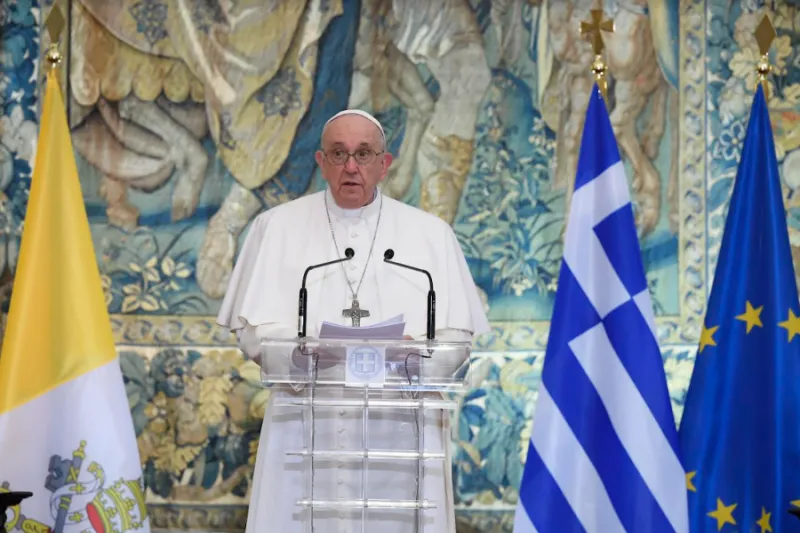
Athens, Greece, Dec 4, 2021 / 04:55 am (CNA).
Pope Francis lamented a global “retreat from democracy” in a speech on Saturday in Athens, the cradle of Western civilization.
The pope was speaking to political leaders, representatives of civil society, and members of the diplomatic corps at the Presidential Palace on Dec. 3, hours after arriving from Cyprus.
“Here democracy was born. That cradle, thousands of years later, was to become a house, a great house of democratic peoples. I am speaking of the European Union and the dream of peace and fraternity that it represents for so many peoples,” the pope said.
“Yet we cannot avoid noting with concern how today, and not only in Europe, we are witnessing a retreat from democracy.”
The pope arrived in Greece after a two-day visit to Cyprus, an island in the eastern Mediterranean Sea. In a packed itinerary, he met Cypriot authorities, Orthodox bishops, local Catholics, and migrants, as well as celebrating Mass in the country’s largest stadium.
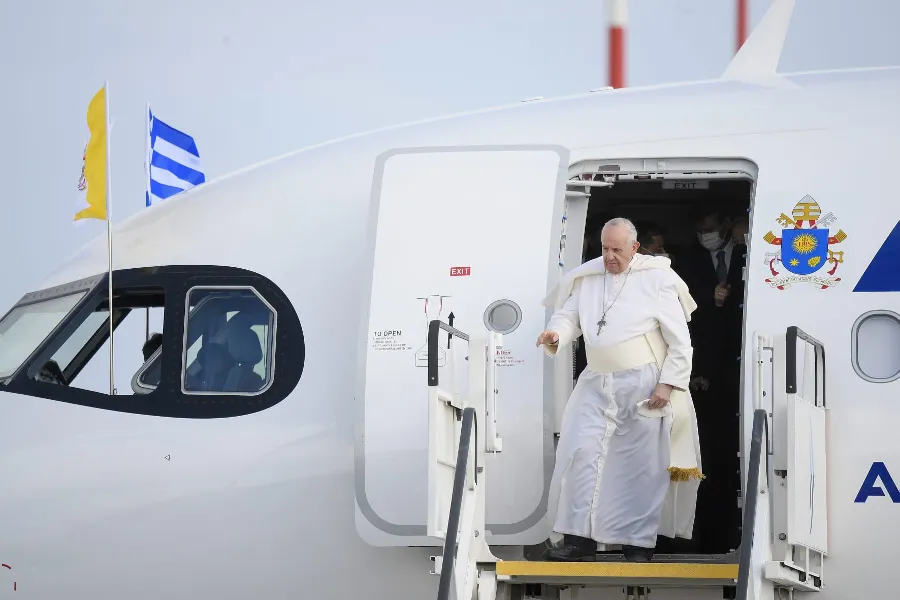
The 84-year-old pope’s three days in neighboring Greece will be equally frenetic, with scheduled meetings with Orthodox leaders, the Catholic community, local Jesuits, migrants on the island of Lesbos, and young people.
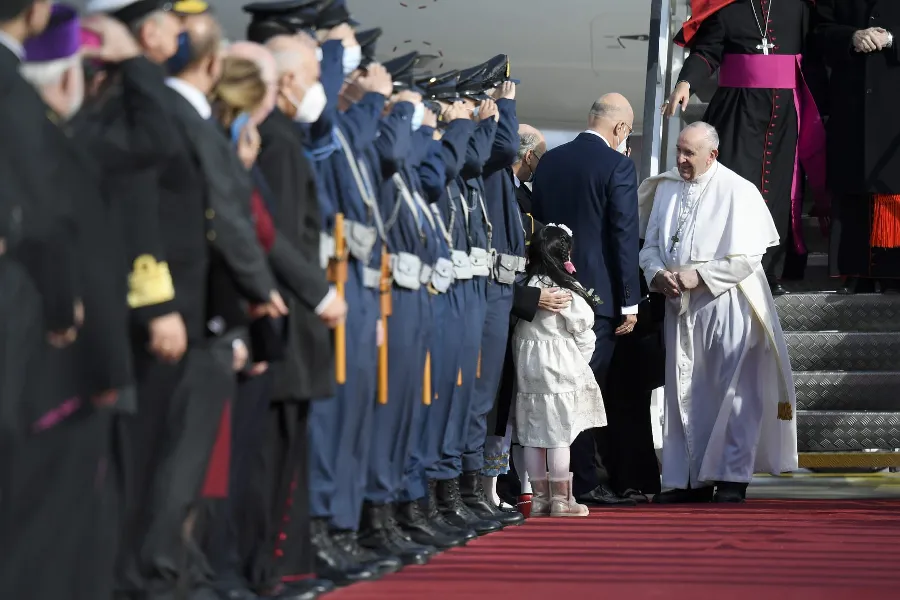
Pope Francis made a daylong visit to Lesbos on April 16, 2016, after which he took 12 refugees back to the Vatican.
He is the first pope to visit mainland Greece since John Paul II, who in May 2001 became the first pope to visit the country in 1,291 years.
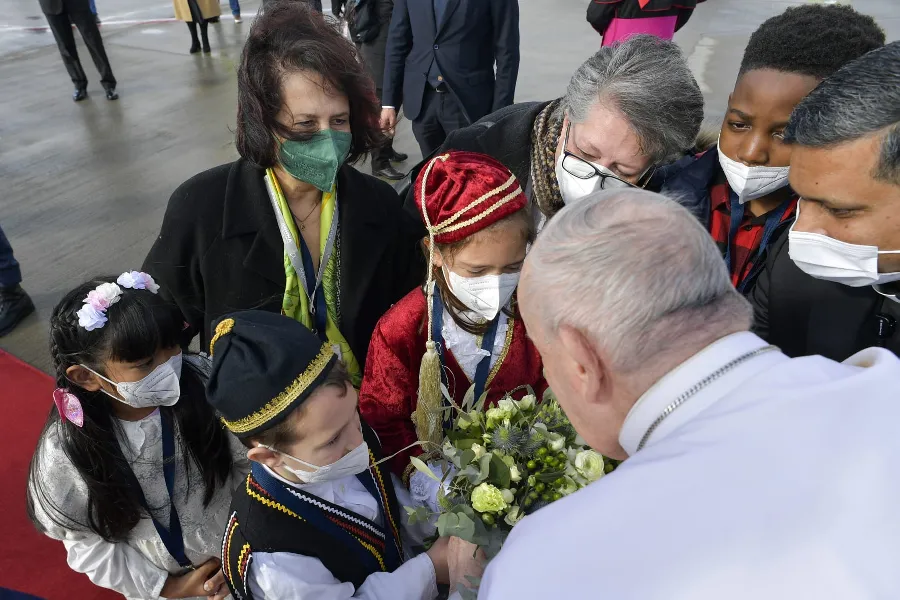
Greece, officially known as the Hellenic Republic, is a predominantly Orthodox Christian country of 10.7 million people, around 50,000 of whom are Catholic.
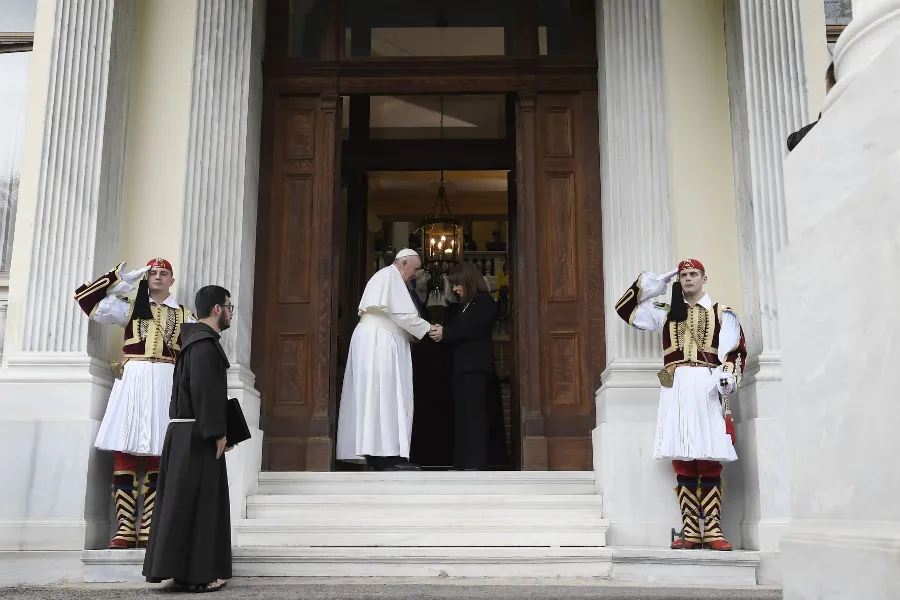
After a farewell ceremony at Larnaca International Airport in Cyprus, the pope departed for Athens. Following an official welcome at the airport, he traveled to the city’s Presidential Palace, where he paid a courtesy visit to Greek President Katerina Sakellaropoulou. Afterward, he met with the Greek Prime Minister Kyriakos Mitsotakis.
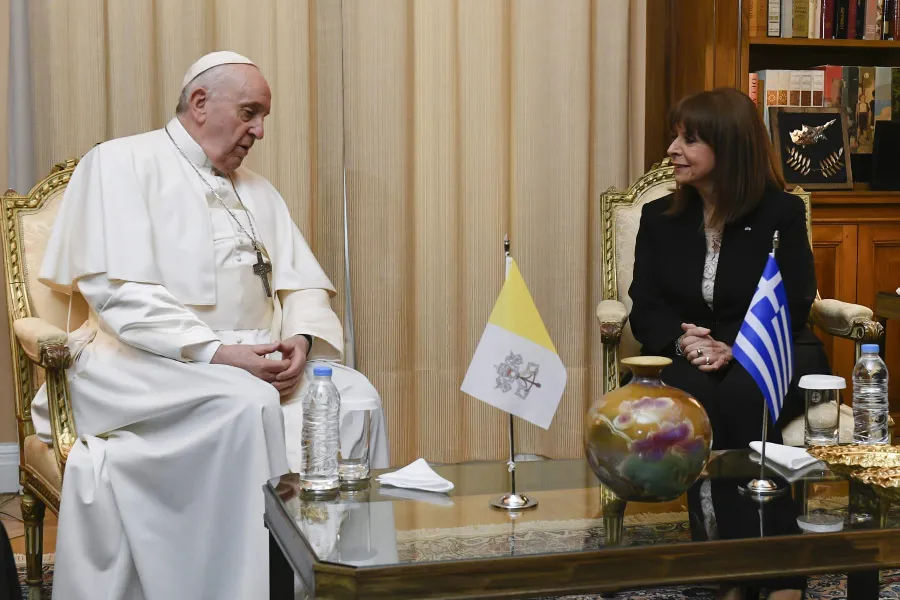
In his live-streamed address, which cited the Greek philosophers Socrates and Aristotle, the pope stressed that democracy requires the participation of all citizens.
“It is complex, whereas authoritarianism is peremptory and populism’s easy answers appear attractive,” he said.
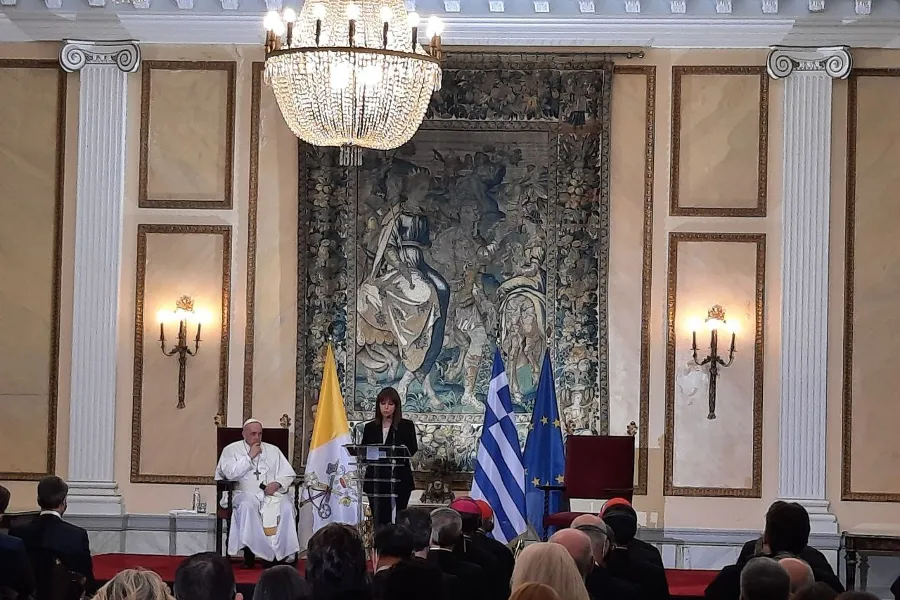
“In some societies, concerned for security and dulled by consumerism, weariness and malcontent can lead to a sort of skepticism about democracy.”
“Yet universal participation is something essential; not simply to attain shared goals, but also because it corresponds to what we are: social beings, at once unique and interdependent.”
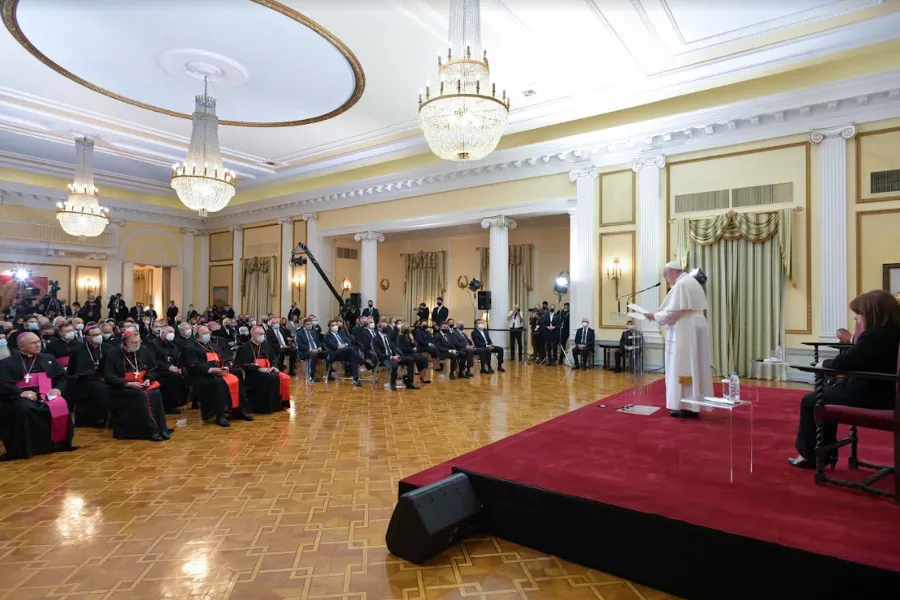
The pope said that another aspect of skepticism about democracy was the loss of faith in institutions.
“The remedy is not to be found in an obsessive quest for popularity, in a thirst for visibility, in a flurry of unrealistic promises or in adherence to forms of ideological colonization, but in good politics,” he said.
“For politics is, and ought to be in practice, a good thing, as the supreme responsibility of citizens and as the art of the common good. So that the good can be truly shared, particular attention, I would even say priority, should be given to the weaker strata of society. This is the direction to take.”
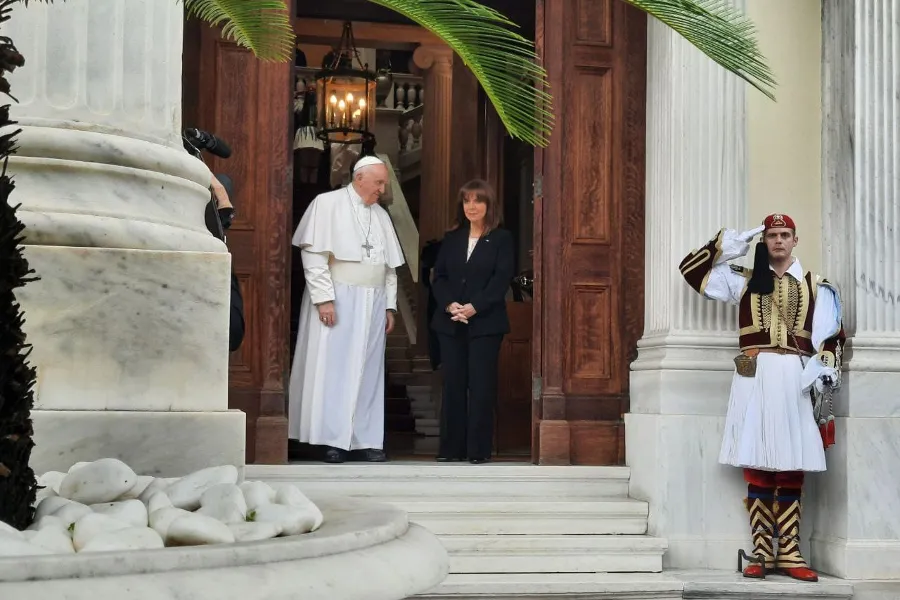
The pope quoted Alcide De Gasperi, one of the founding fathers of the European Union, who said in 1949 that “There is much talk of who is moving left or right, but the decisive thing is to move forward, and to move forward means to move towards social justice.”
The pope commented: “Here, a change of direction is needed, even as fears and theories, amplified by virtual communication, are daily spread to create division.”
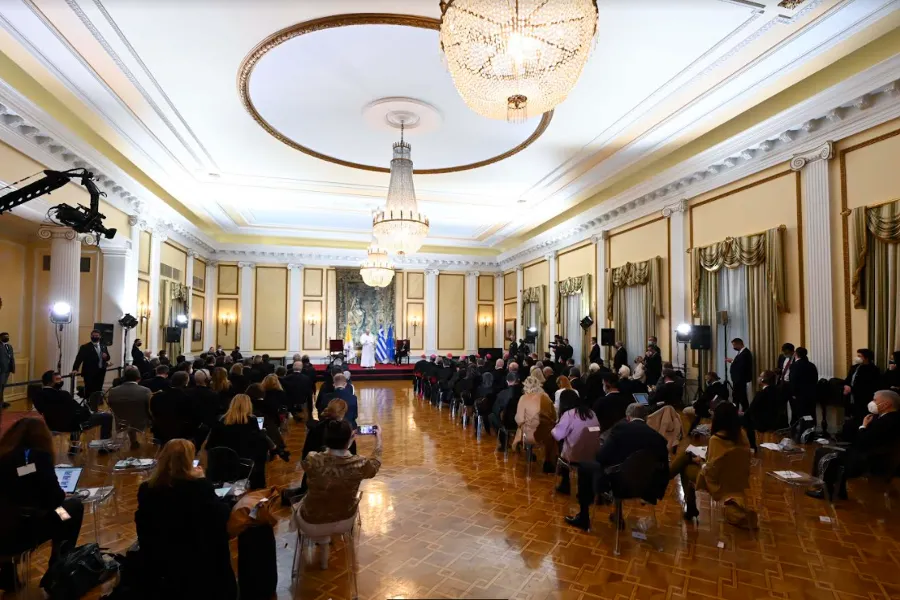
“Let us help one another, instead, to pass from partisanship to participation; from committing ourselves to supporting our party alone to engaging ourselves actively for the promotion of all.”
Greece has a long southern coastline along the Mediterranean Sea and is a popular destination for migrants trying to enter the European Union, a political and economic bloc of 27 member states.
In his address, the pope acknowledged that migration brought new pressures to the local populace, especially in Greece’s islands.
“This country, naturally welcoming, has seen on some of its islands the arrival of numbers of our migrant brothers and sisters greater than the number of their native inhabitants; this has heightened the difficulties still felt in the aftermath of the economic crisis,” he said.
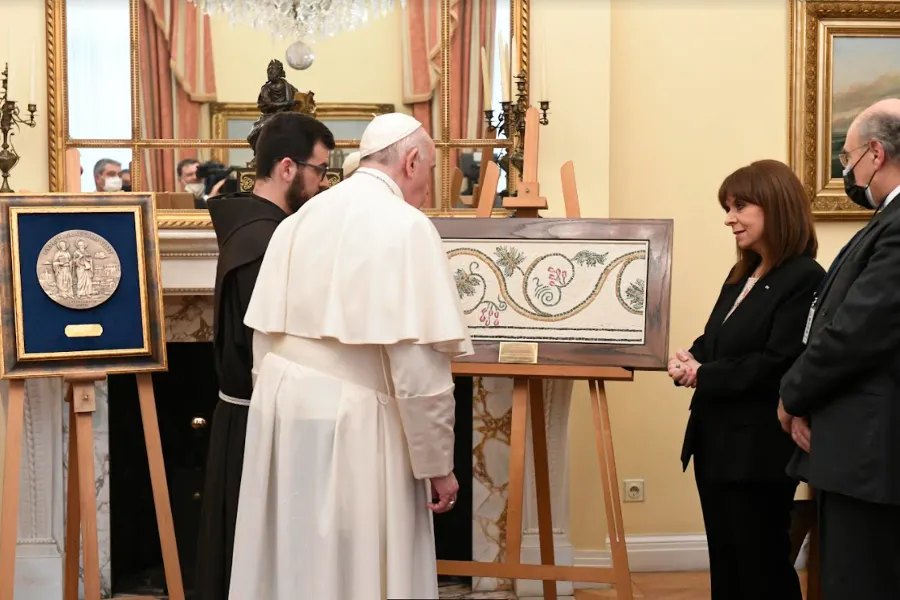
“Yet Europe also continues to temporize: the European Community, prey to forms of nationalistic self-interest, rather than being an engine of solidarity, appears at times blocked and uncoordinated.”
He went on: “In the past, ideological conflicts prevented the building of bridges between Eastern and Western Europe; today the issue of migration has led to breaches between South and North as well.”
“I would like to encourage once again a global, communitarian vision with regard to the issue of migration, and to urge that attention be paid to those in greatest need, so that, in proportion to each country’s means, they will be welcomed, protected, promoted and integrated, in full respect for their human rights and dignity.”
If you value the news and views Catholic World Report provides, please consider donating to support our efforts. Your contribution will help us continue to make CWR available to all readers worldwide for free, without a subscription. Thank you for your generosity!
Click here for more information on donating to CWR. Click here to sign up for our newsletter.





By “Retreating from democracy”, he means “Democratically elected governments not doing what I and my globalist pals want.” Someone should inform the chaplain of the New World Order that if democracy were to be truly practiced in the First World, the immigration wave would be reduced to practically nothing. It is the will of the people that is thwarted so often on this issue as it is with so many others. Thank God for some of the countries of Eastern and Central Europe which are doing all they can to save the West from the fate this Pope and allies have in mind for it.
He decries the rise of populism while he laments what he calls the turning away from democracy. Very well then, he contradicts himself. The only thing that matters is advancing the agenda. If facts and coherence get in the way, then they must be dispensed with. I’d be very interested in hearing what his references to Aristotle and Plato were. It was doubtlessly just superficial name – dropping to bolster his propaganda. Both Greek giants drew sharp distinctions between citizens and foreigners and would have rejected in total the insane program of Francis.
I certainly hope the frenetic pace he and his handlers have set does not prove too much for our 84 year old Pontiff. There is so much important work he still needs to do,.